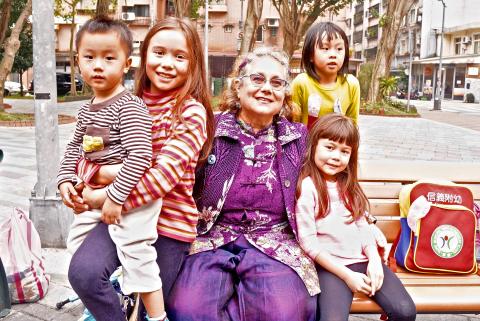Authenticity is a word that can easily be applied to Linda Arrigo (艾琳達), the veteran democracy and Taiwan independence campaigner, human rights advocate, environmentalist and proto-feminist.
She flourished and made a difference to people’s lives at a time when there was belief in the ideas of social justice, equality and even fraternity.
In the present era, when technocrats rule, the idealist is a dinosaur. The big social movements have died out, replaced by lawyers and bankers who seek a mandate from people who don’t believe a word they say. It’s now focus groups and polling numbers, the “economy stupid” and an acceptance among the herd that things will never change.

Photo: Jules Quartly
Arrigo probably wouldn’t like the idea of being painted as among the last of a dying breed, but does admit to being the spirit of a distant age, a conscience — when none is required.
History recalls that she was married to the democracy activist, former Democratic Progressive Party (DPP) chairperson and democracy advocate Shih Ming-teh, (施明德), who once told her: “You’re the only one who hasn’t been corrupted” by power, money or life’s inevitable compromises.
‘RABID RADICAL’ TO THE END

Photo: Jules Quartly
At 67, she’s still a self-confessed “rabid radical.” Writer Jerome Keating* calls her “Taiwan’s resident Marxist.” Granted, she’s slowed down because of a hip problem, and tends to follow history rather than politics these days. But she’s lost none of her vim.
On the DPP’s recent election win, she’s not optimistic. This strikes me as odd, considering she helped give birth to the party. But she believes it has been “diluted” of its beliefs. Of former lawyer and academic Tsai Ing-wen (蔡英文), who will be sworn in as president on May 20, she has little to say beyond “she’s a good administrator.”
In a recent blog, Arrigo called Tsai’s victory, a “culmination of long-term trends within the DPP — bloodless and rational technocrats in the service of Taiwanese and international capital subsuming the passionate anti-dictatorship movements of the 1970s and 80s that were jointly fueled by populist demands at the grassroots.”
Of her former comrade, the jailed dissident and current Kaohsiung Mayor Chen Chu (陳菊), Arrigo didn’t have much to say either, except that the DPP politician gave her a red envelope on the same day as the presidential and legislative elections, which fell on her birthday.
“She was in self-protective mode,” Arrigo says. “Perhaps she was scared I would spill the beans,” she said about the DPP win and the party’s secrets.
INEQUALITY
The product of a Catholic school upbringing and the Kennedy era of idealism, Arrigo followed her soldiering father from the US to Taiwan as a young girl. She attended Taipei American School and mixed with the “great and good.” Yet, on wandering around Taipei, she found poverty, inequality and social iniquity. This revealed to her the “true face of US imperialism” and politicized her.
Though an American, she’s certainly not an apologist for the country. She says the US was pulling the strings of puppet Chiang Kai-shek (蔣介石) in a “very cynical way. It used Taiwan as a pawn, a bulwark against China and for capitalism. In the Shanghai Communique [acknowledging ‘one China’], it knew full well that Taiwan wasn’t a democracy. Taiwan has been boxed in ever since. And the likelihood is that it’s not going to change. It’s too late.”
In the 1960s as a young Marxist, Arrigo would have gone to China, “but no one was allowed to go in those days.” Though a critic of the excesses of Mao Zedong (毛澤東), she understands that China was brutally colonized, and “extreme repression leads to an extreme reaction,”
She even tried to make contact with China in 1979, offering information about Taiwan’s situation: “By contacting them, I came not to believe them.” She reasoned that, “Marxism doesn’t mean you have to agree with a particular regime,” and now believes, “China has developed its own imperialism.”
Thrice married and twice divorced, Arrigo lives alone in New Taipei City’s Shiding District (石碇) in New Taipei City, with her beloved cats.
TRAILBLAZER
She married her first husband, a businessman and “very nice Taiwanese guy,” partly because her dad was a racist and wouldn’t allow it. She eventually left him and her young son because “I didn’t want to end up a suburban housewife.”
“We were trailblazers and paid the price,” is what she tells her son Roger, of whom she is inordinately proud, despite the fact that he’s become a multimillionaire and whose politics would appear to be diametrically opposed to her own.
Democracy activist Shih Ming-teh was her second husband, “a marriage not of convenience but of political necessity.” She is bitter about his philandering and says he has totally betrayed himself, the country and his ideals.
Her third husband was a janitor by day, taxi driver by night and part of a radical underground Taiwan independence group. “I’m not good marriage material and I can’t love one woman that long,” he told Arrigo.
Having given everything for her ideals, Arrigo inevitably lost people along the way. The feminism she supported has, she believes, turned everyone into “wage slaves.”
She says that equality is valid in principle, but the outcome has been “horrid.”
“The fruits of economic development have not been evenly distributed. Intellectuals and manual workers anxiously compete to climb the ladder, and this is so tremendously destructive for people and family life,” she says.
As for the Sunflower movement, it gives her little hope. She notes that there are “some leftists,” but says they tend to get subsumed within the major political parties and lose their beliefs.
In many areas, she says there is not much difference between the DPP and the Chinese Nationalist Party (KMT). Having been an international affairs officer for Green Party Taiwan, she is disappointed that the DPP record of protecting the environment is barely better than the KMT. She basically thinks both parties mouth platitudes and allow big business to poison the water, foul the air and ravage nature.
POLITICS AND HISTORY
These days Arrigo tends not to get involved in politics, aware that a new generation has its own story to tell.
Instead, she prefers to potter around the gravesites of Taipei’s Liuzhangli District (六張犁), and even gives “living history” tours of the site, which is filled with the graves of KMT soldiers, Muslims (who fled the communists) and White Terror victims.
I have known Arrigo for years and over time came to know her as someone who was always well informed. Someone who kept her word. But I really grew to admire her after she took care of her fellow human rights and social activist, Lynn Miles, when he was dying of cancer last year.
Her heart belongs to Taiwan and if causes aren’t fashionable now, they likely will be again some day. At which time she will be seen as a kind of spirit guide, a haunting conscience, on the side of equality, social justice and caring for the environment.
1 0H 1: Can refer to Taipei 101; an introductory course or analysis; One uh One, a spare male at a party, or a useless person — always male; there are about 1.01 men for every 1 woman, thus, every one hundred and first male is not going to find a partner; a one-on-one interview
* This story originally stated that Michael Turton was the source of this quote. The quote was actually given by Jerome Keating. The Taipei Times regret the error.

Taiwan has next to no political engagement in Myanmar, either with the ruling military junta nor the dozens of armed groups who’ve in the last five years taken over around two-thirds of the nation’s territory in a sprawling, patchwork civil war. But early last month, the leader of one relatively minor Burmese revolutionary faction, General Nerdah Bomya, who is also an alleged war criminal, made a low key visit to Taipei, where he met with a member of President William Lai’s (賴清德) staff, a retired Taiwanese military official and several academics. “I feel like Taiwan is a good example of

March 2 to March 8 Gunfire rang out along the shore of the frontline island of Lieyu (烈嶼) on a foggy afternoon on March 7, 1987. By the time it was over, about 20 unarmed Vietnamese refugees — men, women, elderly and children — were dead. They were hastily buried, followed by decades of silence. Months later, opposition politicians and journalists tried to uncover what had happened, but conflicting accounts only deepened the confusion. One version suggested that government troops had mistakenly killed their own operatives attempting to return home from Vietnam. The military maintained that the

Jacques Poissant’s suffering stopped the day he asked his daughter if it would be “cowardly to ask to be helped to die.” The retired Canadian insurance adviser was 93, and “was wasting away” after a long battle with prostate cancer. “He no longer had any zest for life,” Josee Poissant said. Last year her mother made the same choice at 96 when she realized she would not be getting out of hospital. She died surrounded by her children and their partners listening to the music she loved. “She was at peace. She sang until she went to sleep.” Josee Poissant remembers it as a beautiful

Before the last section of the round-the-island railway was electrified, one old blue train still chugged back and forth between Pingtung County’s Fangliao (枋寮) and Taitung (台東) stations once a day. It was so slow, was so hot (it had no air conditioning) and covered such a short distance, that the low fare still failed to attract many riders. This relic of the past was finally retired when the South Link Line was fully electrified on Dec. 23, 2020. A wave of nostalgia surrounded the termination of the Ordinary Train service, as these train carriages had been in use for decades